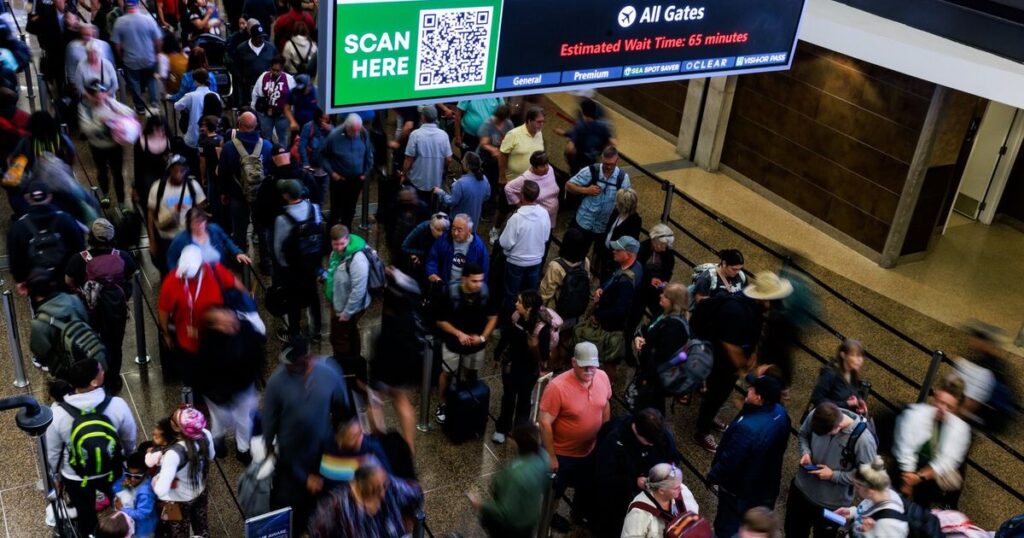Congress passed a $105 billion bill Wednesday to reauthorize the Federal Aviation Administration. The bill is a must-pass bill to fund the agency that oversees air travel in the United States.
The more than 1,000-page bill includes several updates to the rules governing air travel and aviation that directly impact aerospace companies like Boeing and the millions of passengers who use U.S. airports every day. It is.
Sen. Maria Cantwell, D-Wash., said the bill represents a “huge victory” for Americans. Cantwell, chairman of the Senate Commerce Committee, was one of the lead negotiators on the bill, along with Rep. Rick Larsen (D-Everett), ranking member of the House Transportation and Infrastructure Committee. Republican Sen. Ted Cruz (R-Texas) and Rep. Sam Graves (R-Missouri) also participated.
Here's what will and won't change under the FAA reauthorization bill.
Refunds: Passengers are entitled to a refund if their flight is canceled or delayed (3 hours for domestic flights, 6 hours for international flights) and choose not to rebook or receive a travel credit . Under the reauthorization bill, airlines would automatically issue refunds. This codifies the Department of Transportation's regulations regarding refunds announced last month. If your family sits together on a plane, you won't be charged for it.
Extension of Boeing 767 Freighter at Everett Plant: The bill includes a provision that would allow Boeing an additional five years to continue manufacturing 767 freighters at the Everett plant. Boeing was expected to phase out the plane in 2027 because it does not comply with international emissions regulations. The terms, first reported by Air Current, allow Boeing to build cargo ships until 2033.
Air Traffic Controller Shortage: The FAA is required to improve staffing standards and set hiring goals to address the air traffic controller shortage. The FAA has 13,865 air traffic controllers in 2023 and hopes to hire about 3,000 more. Cantwell's office said Washington state is short about 88 air traffic controllers at air traffic control centers, and control towers are about 75% staffed.
Updated recording devices: All airliners will be required to have a recording device in the cockpit that can store 25 hours of audio, instead of the current recording device that can only record two hours. Lawmakers repeatedly cited an Alaska Airlines flight in January in which a panel erupted during ascent from the Portland airport as one reason for updating the recording device. At that time, the cockpit recording immediately after the explosion was overwritten.
Accessibility: The reauthorization requires the FAA to consider whether it is economically and financially feasible to configure airplane seating to accommodate passengers in wheelchairs in the main cabin. It also includes a provision for the FAA to improve evacuation standards. Current standards require all passengers to be evacuated within 90 seconds, but lawmakers argue that the tests do not take into account full flights or passengers with disabilities. The Muscular Dystrophy Association called the bill the most significant improvement to air travel for people with disabilities in nearly 40 years.
“The FAA's reauthorization will ensure a fair, safe, and dignified travel experience for people with neuromuscular and related disabilities,” MDA President and CEO Donald S. Wood said in a news release. This is an important step towards creating a
Research, Workforce Development, and Education Programs: The reauthorization bill would continue to operate the FAA's Centers of Excellence program, which provides training and research through partnerships with schools such as the University of Washington and Washington State University. The bill increases aviation workforce recruitment and growth grant funding to $60 million annually. $12 million will go toward aviation education programs to recruit and retain members of underrepresented communities within the aviation industry.
Slots at Reagan National Airport: One of the most hotly debated issues during months of negotiations had nothing to do with safety oversight or consumer protection. Instead, lawmakers fought over whether to add additional long-haul flights to Reagan National Airport outside Washington, which is primarily short-haul. said it was sacrificing safety to add more direct flights. Alaska Airlines already operates flights from Seattle to Reagan, so it's unlikely these slots will be allocated to another Seattle flight.



